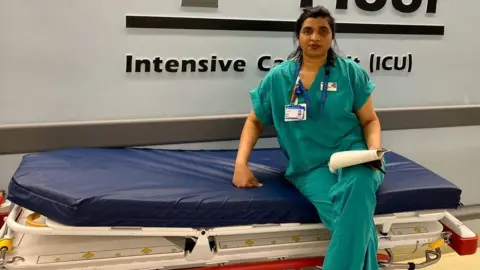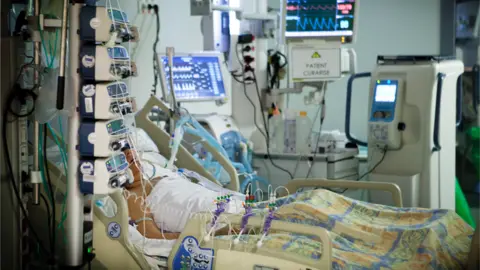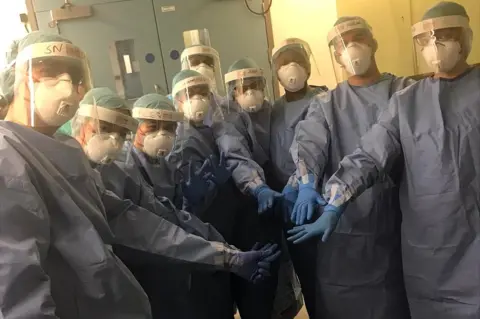Coronavirus: 'I spend the final moments with dying patients’
 Juanita Nittla
Juanita NittlaHaving access to a ventilator can mean the difference between life and death for patients who are seriously ill with Covid-19. But sometimes even these breathing machines cannot save someone's life.
Juanita Nittla is a senior sister in the intensive care unit (ICU) at London's Royal Free Hospital. She is often present when the support these machines provide is withdrawn.
Ms Nittla has been working for the NHS as an intensive care specialist nurse for the past 16 years.
The work can be traumatic and painful, the 42-year-old says. "Sometimes I feel like I am somewhat responsible for someone's death."
Ventilators take over the body's breathing process when coronavirus has caused the lungs to fail. This gives the patient time to fight off the infection and recover, but sometimes it's not enough.
Medical teams face tough decisions about when to stop treatment for patients who aren't getting better. The decision is made after careful consideration, analysing factors such as the age of the patient, underlying health conditions, their response to the virus and likelihood of recovery.
At the start of a morning shift in the second week of April, Ms Nittla was told by the registrar in the ICU that her first task would be to stop treatment for a nurse in her 50s with Covid-19.
Restrictions in place at the time meant that she had to talk through what would happen with the woman's daughter on the phone (Health Secretary Matt Hancock has since said that close family members would be able to see dying relatives to say goodbye under new coronavirus guidelines).
"I reassured her that her mum was not in pain and looked very comfortable," Ms Nittla said. "I also asked about her mother's wishes and religious needs."
 Getty Images
Getty ImagesMs Nittla's patient was in an eight-bed bay, surrounded by people who were also unconscious.
"I closed the curtains and turned off all the alarms."
The medical team stopped talking and Ms Nittla placed a phone next to the patient's ear, and asked her daughter to speak.
Ms Nittla played the music the family had requested and the support provided by the ventilator was withdrawn.
"I saw flashing lights on the monitor and the heart rate hit zero - flat line - on the screen," she says.
"I stood beside her, holding her hands until she passed away."
The patient died in less than five minutes and Ms Nittla disconnected the tubes providing sedation drugs.
The patient's daughter was still talking to her mother and Ms Nittla picked up the handset to tell her it was all over.
"With the help of a colleague, I gave her a bed bath and wrapped her in a white shroud and placed her in a body bag. I put a sign of the cross on her forehead before closing the bag," she says.
Nightmares
Ms Nittla says that being able to care for the dying has helped her cope with the crisis.
Due to a massive surge in the number of admissions, the hospital's critical care unit has expanded from 34 to 60 beds.
"Normally in critical care we maintain a one-to-one ratio [one nurse per patient]. Now it is one nurse for every three," says Ms Nittla.
"If the situation continues to worsen, it will be one for every six patients."
Some nurses in her team have shown symptoms of the virus and are now in self-isolation. The hospital is retraining other support nurses to work in critical care.
"Before the start of the shift we hold our hands together and say 'stay safe!'. We keep an eye on each other. We make sure everyone is wearing the gloves, masks and protective gear properly," says Ms Nittla.
 Juanita Nittla
Juanita NittlaThe ICU is recording one death per day, well above the average they had before the pandemic.
"It is daunting," says Ms Nittla. As a senior sister, she sometimes has to suppress her own fears.
"I do have nightmares. I am unable to sleep. I worry I will get the virus. Everyone is scared."
Last year she was away from work for months after getting tuberculosis. She knows her lung capacity is diminished.
"People tell me I shouldn't be working but this is a pandemic. I put everything aside and do my job," she says.
"At the end of my shift I do think of the patients who died in my care, but I try to switch off when I step outside of the hospital."
Since speaking to the BBC, Ms Nittla has been asked by her employer to remain at home, due to her underlying health condition. She plans to continue to offer support by doing administrative tasks, working from home.

- A SIMPLE GUIDE: How do I protect myself?
- AVOIDING CONTACT: The rules on self-isolation and exercise
- LOOK-UP TOOL: Check cases in your area
- MAPS AND CHARTS: Visual guide to the outbreak


What is 100 Women?
BBC 100 Women names 100 influential and inspirational women around the world every year. We create documentaries, features and interviews about their lives - stories that put women at the centre.
